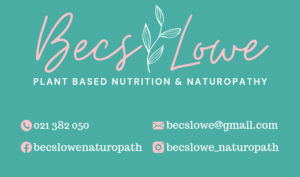Article written by Bec’s Lowe – Nutritionist and Naturopathy
When you’re feeling stressed, the foods that you’re turning to are most likely going to be traditional ‘comfort’ foods – think big meals, takeaways, fatty foods, sweet foods, and alcohol. Let’s face it – we’ve all found some comfort in a tasty meal and a bottle of beer or glass of wine when we’ve been stressed out or upset about something. However, this isn’t a good permanent solution.
When you’re turning to unhealthy foods you can feel better temporarily, but in the long run, you will feel worse. When your body isn’t getting the right nutrition, you can begin to feel less energetic, more lethargic, and in some cases less able to concentrate and focus. All of this can lead to even more stress.
Foods that Fight Stress
If you’ve been feeling more stressed out than usual lately, it’s important to know which foods are best to choose and which to avoid in helping you deal with feelings of stress and anxiety. The best way to fight stress is to have a healthy, balanced diet which includes a moderate amount of each of the different food groups.
Filling up on foods such as whole grains, leafy vegetables, and lean proteins as the basic staples of the diet is the best way to ensure that your body gets the optimum amounts of nutrients to fight both physical and mental health problems. When it comes to choosing the foods to eat, some have a range of great properties which help the body to combat stress. Choosing these stress-busting foods will help to heal and calm your mind permanently, rather than providing a temporary fix.
Some of the best stress-fighting foods include:
Avocado – Avocados are a creamy and versatile fruit which can be eaten in a range of different ways whether you enjoy them raw, made into sauces, dressings and dips (think guacamole), or in a smoothie. These nutrient-dense fruits have the properties to stress-proof your body, thanks to their high glutathione content which specifically blocks the intestinal absorption of certain fats which cause oxidative damage. Avocados also contain higher levels of vitamin E, folate, and beta-carotene than any other fruit, which boosts their stress-busting properties.
Blueberries – If you’re feeling stressed out and reaching for snacks, swapping chocolate or chips for one of the best superfoods is a great way to help you deal with your stress levels and achieve a higher level of calm. Blueberries have some of the highest levels of antioxidants, especially antho-cyanin, which means that this berry has been linked to a wide range of health benefits including sharper cognition, better focus, and a clearer mind – all of which can help you to better deal with stress. If it’s not berry season, keep a bag of blueberries in the freezer and munch on the little frozen delights.
Chamomile Tea – Of course, it’s not all about what you’re eating when it comes to managing stress; what you’re drinking can also alleviate or worsen the stress you’re feeling. Drinking liquids which are high in sugars and caffeine, such as coffee, energy drinks or fizzy, can actually increase your stress levels if consumed regularly. Chamomile tea has long been used as a natural bedtime soother, and it has also been used in clinical trials, which determined that chamomile tea is effective in reducing the symptoms of generalized anxiety disorder. Try chamomile tea on its own or in one of the many relaxing blends you can get at the supermarket.
Chocolate – Although it’s usually seen as an unhealthy treat, there is an undeniable link between chocolate and our mood. Studies have shown that eating chocolate can actually make you happier. However, that doesn’t mean that you can start munching on chocolate bars every time you’re stressed out – chocolate works best as a de-stressor when eaten in moderation and as part of a healthy and balanced diet. Dark chocolate in particular is best for you, as it contains more flavanols and polyphenols, two hugely important antioxidants which can help combat stress. Look for chocolate with at least 70% cocoa content as this has less fat and sugar and more health benefits.
Oatmeal – Oatmeal is great in that it can be a filling comfort food, but also has a large number of healthy properties to actually make you feel better from the inside out. A complex carbohydrate, eating oatmeal causes your brain to produce higher levels of the feel-good chemical serotonin, helping you to feel calmer and less stressed. Studies have shown that kids who choose oatmeal for breakfast tend to be much sharper throughout the morning in school compared to kids who had alternative morning meals.
Walnuts – If you’re looking for a healthy snacking option which will help you to stay better in control of your stress levels, walnuts are a great choice. Have you ever noticed the resemblance of a walnut to the human brain? It is no coincidence that walnuts help to keep your brain and nervous system functioning well. High in omega-3 fatty acids walnuts can also help to raise melatonin levels which leads to better sleep, a necessity for combatting stress. A versatile nut, walnuts are great for salads, on oatmeal, in smoothies or just snack on them raw.
Pistachios – another food which is great for snacking on and can also help to combat stress and anxiety in the long term is pistachios. Studies have found that simply eating two small, snack-size portions of pistachios per day can lower vascular constriction when you are stressed, putting less pressure on your heart by further dilating your arteries. Along with this, the rhythmic, repetitive act of shelling pistachios can actually be quite therapeutic!
Green Leafy Vegetables – leafy, green vegetables should be a pivotal part of anyone’s diet. Along with helping to combat stress, leafy greens are full of nutrients and antioxidants which help to fight off disease and leave your body feeling healthier and more energized. Dark leafy greens, for example spinach, are especially good for you since they are rich in folate, which helps your body to produce more mood-regulating neurotransmitters such as serotonin, which is a ‘feel-good’ chemical.


